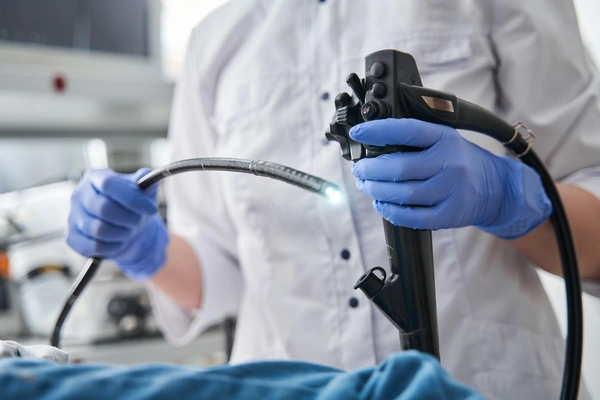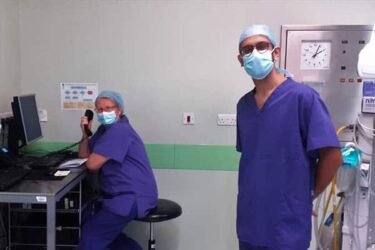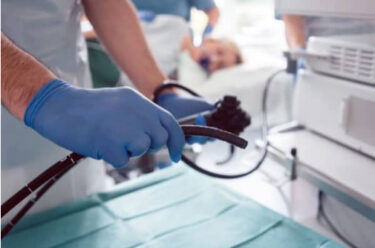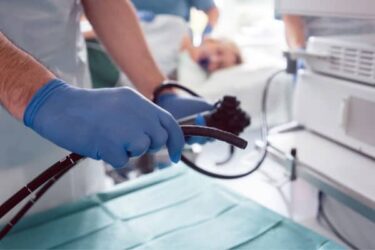Estimated reading time: 6 minutes
Endoscopy is a medical procedure that involves examining the digestive tract with a camera to help diagnose and treat various gastrointestinal conditions.
In this blog, we delve into the details of private endoscopy costs in the UK to help provide you with a better understanding of what to expect.

Private endoscopy at a glance
- Waiting time: 4-6 weeks
- Cost: £1,399-£1,849
- Ways to pay: self-pay, insured, finance options
How much does an endoscopy cost in the UK?
Private endoscopy prices in the UK can vary depending on the following factors:
- the type of endoscopy – there are several different types of endoscopy to check various areas of the body. These include gastroscopy to look at the upper digestive tract via the mouth, and flexible sigmoidoscopy or colonoscopy to look into the bowel/colon via the anus. Each procedure will vary in price, complexity, and the type of specialised equipment used
- your location – the region or city where you choose to have the endoscopy may also impact the cost. Varying prices around location may depend on the local cost of living, demand for local healthcare services, and the availability of medical facilities
- the clinic or hospital – private hospitals or clinics may have varying price structures based on their reputation, facilities, and location.
What’s the average cost of endoscopy?
While specific costs vary, prices for private endoscopy in the UK generally range from the following:
- Gastroscopy: £1,000 – £2,500
- Colonoscopy: £1,200 – £3,000 (the average cost is around £2,200)
Endoscopy prices at Practice Plus Group
At Practice Plus Group, our endoscopy prices are generally less expensive than our competitors:
- Colonoscopy procedure is £1,849
- Gastroscopy is £1,399
- Flexible sigmoidoscopy procedure is £1,399
See our full list of private surgery costs for the UK.
What’s included?
- pre-procedure advice from a trained nurse around necessary alterations to medication so the procedure can be carried out safely
- if you are booked for colonoscopy, this will include discussion of dietary changes and bowel preparation required
- conscious sedation, Entonox™ and local anaesthetic throat spray are available in all our units to support patient comfort
- a verbal report of your findings, after the procedure
- a written report for you to take home detailing the outcome of your procedure, a copy of which will be sent to your referrer.
Patient testimonial
“The endoscopy staff at Practice Plus Group Surgical Centre, St Mary’s Portsmouth were fantastic and put me at ease straight away. They were so nice and what I thought was going to be an horrible experience, wasn’t.”
Endoscopy patient at Practice Plus Group Surgical Centre, St Mary’s Portsmouth
The benefits of having a private endoscopy procedure
People opt for private endoscopy for various reasons. These include but aren’t exclusive to the following reasons:
- faster access to treatment
- reduced endoscopy waiting lists
- flexibility in appointment scheduling
- access to a more personalised experience.
At Practice Plus Group, you’ll have access to your choice of highly skilled and experienced endoscopists for your treatment.
Ways to pay
You can pay for your endoscopy in the following ways:
- Pay for yourself: Pay for the procedure directly in a one-off payment, using personal funds or savings
- Health insurance: You can use private health insurance to cover part or all of the cost. Check with your insurance company to see if endoscopy is covered by your policy
- Payment plans: Use our financing option to spread the cost over time into a more manageable amount.
How do I get an endoscopy privately? Next steps
If you think you may need an endoscopy, taking the next step is easy. You will require a referral from either your GP or a hospital specialist. We currently do not accept self-referrals for endoscopy.
How it works
During the procedure, a long, thin, flexible tube called an endoscope is inserted gently into your digestive tract either through your mouth or into your bottom/anus to investigate your symptoms. The endoscope transmits detailed pictures to a monitor so that the endoscopist and assistants can diagnose and manage any issues they find.
One channel of the endoscope allows the endoscopist to take small samples of tissue from the digestive tract lining called biopsies. For colonoscopy and flexible sigmoidoscopy, the endoscopist can remove polyps or growths through the same channel if safe to do so.
Preparing for an endoscopy
You will be asked to stop eating and drinking for several hours before your endoscopy to avoid any complications.
Depending on the type of procedure you are having, the preparation will be explained to you but a summary is shown:
- for colonoscopy, you will need to change your diet to one with low fibre for three days and take strong laxatives for 24 hours before your procedure. Your will be able to carry out these steps in your own home
- for flexible sigmoidoscopy, you will usually require an enema to flush out your lower bowel, and you will usually administer this yourself in the privacy of your own home after receiving some instruction on how to carry it out
- for gastroscopy, you will need to avoid food and significant drinks for six hours pre-procedure but can have sips of water up to two hours before your test.
Before having an endoscopy, make sure your doctor is aware of any medical conditions you have. Don’t be afraid to ask them any questions about how to prepare for surgery and what happens during the procedure.
Booking a consultation
To book an initial consultation at a time that suits you, either fill in the form on this page or call our friendly team on 0330 822 6531.
Find private endoscopy near you
We offer private endoscopy at hospitals and treatment centres around the country. As a group of specialist hospitals, we only provide scheduled endoscopy, which means you can feel confident that your procedure will happen as planned.
Look for a private treatment centre near you to get convenient treatments with low waiting times.
Private endoscopy offers quicker access to diagnosis and treatment.





